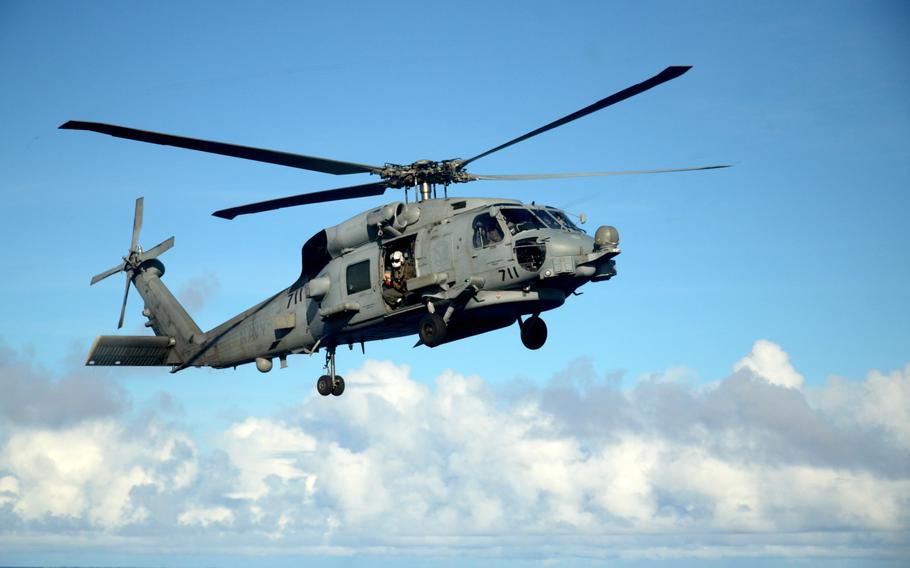
An MH-60S Seahawk helicopter prepares to land aboard the USS Ronald Reagan during a multi-carrier exercise in the Philippine Sea, Monday, Nov. 6, 2023. (Alex Wilson/Stars and Stripes)
ABOARD USS CARL VINSON IN THE PHILIPPINE SEA — The roar and rumble of fighter jets began early Sunday and carried on steadily through the night, part of a joint U.S.-Japan drill meant to showcase the two nations as a “cornerstone of peace and deterrence” in the region.
Dubbed a “multiple large deck event” by the Navy, the exercise included the aircraft carriers USS Ronald Reagan and USS Carl Vinson, the Japanese helicopter carrier JS Hyuga, approximately 150 aircraft and more than 10,000 sailors in a demonstration of air and naval power in the Indo-Pacific.
But despite its scale, the U.S. Navy and Japan Maritime Self-Defense Force repeatedly emphasized the training’s routine nature.
“The capabilities that you will see — and will not see — assembled here is indeed impressive; it is also somewhat routine,” Rear Adm. Pat Hannifin, commander of Carrier Strike Group 5, told reporters gathered Monday aboard the Ronald Reagan. “We can, and do, bring together bilateral and multilateral forces of this size, breadth and capability many times each year across the Indo-Pacific.”
Scheduled to run until an undisclosed time this week, the exercise began Saturday about 500 to 700 nautical miles east of Luzon, Philippines, Carrier Strike Group 5 spokesman Lt. Cmdr. Seth Koenig told Stars and Stripes by email Tuesday.
That places the flotilla roughly 800 nautical miles southeast of Taiwan.
China often criticizes U.S.-led exercises in the Philippine Sea and the adjacent South China Sea as aggressive and counteractive to peace in the region. Beijing claims nearly all the South China Sea as its territorial waters.
The U.S. and Japan, on the other hand, say their presence preserves freedom of movement through the area.
The issue is a case of the “eye of the beholder,” Hannifin said, adding that both the U.S. and Japan have been operating and training in the region for decades.
“To fly, sail and operate everywhere that international law allows is what ensures that flying, sailing and operating and free trade across this region is maintained,” he told reporters. “I would suggest it is not, certainly not, provocation. This is a standard and a normal exercise of our individual nations’ capabilities.”
Hannifin added that the exercise is not aimed at deterring any specific nation, but rather to indicate the capabilities of the U.S. and its allies to “any potential adversary, regardless of who they are.”
The Chinese aircraft carrier Shandong, along with two destroyers, a frigate and a support ship, were operating several hundred miles away in the South China Sea as of Sunday, Japan’s Joint Staff said in a news release Monday.
On Sunday afternoon, the flight decks and below-decks hangars on the Ronald Reagan and Carl Vinson were buzzing with activity.
Pilots flew scores of sorties aimed at honing air-defense and air-combat skills while the escort warships practiced coordinated maneuvers and maritime strike drills. Meanwhile, U.S. and Japanese sailors swapped places to learn more about their counterparts.
That pace hardly slowed as night fell on Sunday. Aboard the Carl Vinson, F-18 Super Hornet and F-35 Lightning II fighter jets continued to launch and land, while mechanics labored away in the ship’s massive hangar.
Exercises like this are “demanding,” but the crew is more than capable of handling it, Petty Officer 2nd Class Rowland Smith told Stars and Stripes aboard the Carl Vinson on Sunday.
“A big challenge is definitely the temperature,” he said, referring to the hot and humid hangars he works in.
Multi-carrier exercises aren’t new, but they are relatively rare when compared to other drills.
The day before the ships rendezvoused in the Philippine Sea, the USS Gerald R. Ford — the Navy’s newest aircraft carrier — and the USS Dwight D. Eisenhower concluded drills in the Mediterranean Sea. The carriers and their strike groups trained Nov. 1-3 alongside two Italian frigates.
Previous multi-carrier exercises include a June 9 drill between the Ronald Reagan and the aircraft carrier USS Nimitz and the Japanese helicopter destroyer JS Izumo joined with Canadian and French warships for another multiple large deck event in the Philippine Sea.
China, at the time, deployed a Y-9 cargo plane fitted with surveillance equipment to the area, where it “likely tracked, monitored and gathered intelligence” on the exercise, the Chinese state-sponsored Global Times news website reported June 11, citing analysts.